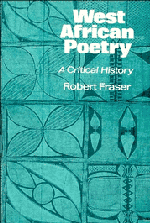Book contents
- Frontmatter
- Contents
- Acknowledgements
- West Africa: State borders and principal ethnic groupings
- Introduction
- 1 From oral to written verse: development or depletion?
- 2 Ladies and gentlemen
- 3 The négritude movement
- 4 Poetry and the university, 1957–63
- 5 The achievement of Christopher Okigbo
- 6 Continuity and adaptation in Ghanaian verse, 1952–71
- 7 Two Ijo poets
- 8 ‘Psalmody of sunsets’: The career of Lenrie Peters
- 9 The road to Idanre, 1959–67
- 10 The poet and war, 1966–70
- 11 The poetry of dissent, 1970–80
- 12 The return to orality
- A guide to availability
- Index
6 - Continuity and adaptation in Ghanaian verse, 1952–71
Published online by Cambridge University Press: 03 May 2011
- Frontmatter
- Contents
- Acknowledgements
- West Africa: State borders and principal ethnic groupings
- Introduction
- 1 From oral to written verse: development or depletion?
- 2 Ladies and gentlemen
- 3 The négritude movement
- 4 Poetry and the university, 1957–63
- 5 The achievement of Christopher Okigbo
- 6 Continuity and adaptation in Ghanaian verse, 1952–71
- 7 Two Ijo poets
- 8 ‘Psalmody of sunsets’: The career of Lenrie Peters
- 9 The road to Idanre, 1959–67
- 10 The poet and war, 1966–70
- 11 The poetry of dissent, 1970–80
- 12 The return to orality
- A guide to availability
- Index
Summary
When we turn from Nigeria to look at the poetry which had emerged in Ghana since the 1950s we enter an atmosphere at once akin and sharply different. No traveller from one country to the other can fail to notice a communality of cultural response, custom, gesture, expression, aspiration and attitude. At the same time no one who has lived or worked in both countries can also fail to be aware after a time of a fundamental difference of tempo, a different level of tension that marks one nation from the other, however arbitrary the boundaries of each may be. Ghana and Nigeria were both British colonies. Both were exposed from a period not long after the closing of the European middle ages to tentative but occasionally brutal incursions along the coast. Both were subject to the debilitating slave trade, the tentacles of which reached from trading posts and forts in the south into the remotest hinterland. Both were formerly occupied from the end of the nineteenth century, and were fed with a palliative promise of self-government throughout the 1930s and 1940s. Both attained independence at approximately the same period (Ghana, 1957; Nigeria, 1960), and have subsequently largely abandoned the Westminster model of legislative democracy for alternating phases of experimental democracy and military control.
- Type
- Chapter
- Information
- West African PoetryA Critical History, pp. 138 - 167Publisher: Cambridge University PressPrint publication year: 1986



